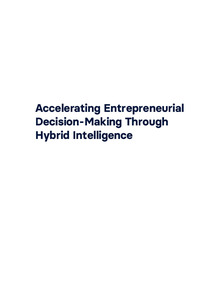| dcterms.abstract | Purpose: Previous studies revealed that around 75 percent of all start-ups fail at an early stage. One main reason for this tremendous failure rate is that entrepreneurs are typically confronted with high levels of uncertainty about the viability of their proposed business idea. Following this argumentation, entrepreneurial decision-making can be defined as complex decision-making problem under both risk and uncertainty. While risk includes quantifiable probabilities, uncertainty describes situations where neither outcomes nor their probability distribution can be assessed a priori. Consequently, the entrepreneurial decision-making context is highly complex and contains lots of “black swan events” that seems to be unpredictable. As previous research does not provide any IT-based and scalable solutions for decisional guidance in such contexts, the purpose of this study is to explore the entrepreneurial decision- making context and then suggest novel and innovative design paradigms and design principles for decisional guidance in the context of entrepreneurial decision-making.
Methodology: This thesis uses multiple methodologies and methodological paradigms such as conceptual development and analysis of previous literature, qualitative methods, quantitative methods, and design science research.
Findings: The findings of this thesis reveal the ecosystem as a source of risk and uncertainty, thus, providing a deeper understanding of the entrepreneurial decision-making context. Based on this examination, the dissertation offers crowd-based decisional guidance as first design paradigm and develops design principles for developing DSS based on the crowdsourcing paradigm. Following those findings, hybrid intelligence is proposed as superior design paradigm for decisional guidance that leverages the complementary benefits of human intelligence and AI. Then, design principles for the development of DSS based on hybrid intelligence are developed.
Theoretical Contribution: This dissertation provides several contributions to the existing body of knowledge. First, the mechanisms of the ecosystem for creating risk and uncertainty are explored in the context of entrepreneurial business model decisions. Second, the studies in this thesis explore the cognitive rational for the limitations of previous forms of human provided guidance and how collective intelligence can overcome those limitations from a cognitive point of view. Third, the requirements for crowdsourcing as a design paradigm in complex decision-making problems are proposed, thus, pointing towards a further development of crowdsourcing for more domain specific and complex problems. Fourth, hybrid intelligence is conceptually developed as design paradigm for decisional guidance that can overcome limitations of both humans and ML applications by levering their complementary benefits. Therefore, this proposes a socio-technical design for making AI ready for the wild. Finally, design principles for a HI-DSS are proposed as design knowledge contribution that might lead to a design theory for HI-DSS for complex decision- making problems in general in the future.
Practical Contribution: The practical contribution of this thesis is threefold. First, design knowledge on digital business models is derived that allows to provide practitioners a rational for developing new business models. Second, this thesis proposes design knowledge for crowd-based services in entrepreneurship that allow business incubators to extend their service portfolio. Finally, this thesis provides fully implemented DSS for developing new business models based on the paradigm of hybrid intelligence.
Outlook: Based on the findings of this thesis, four directions for future research are provided. First, future work should further examine IT-based business model tools. Second, this thesis proposes the interaction design in hybrid intelligence systems as valuable field for further analysis. Third, incentivation mechanisms for human input in hybrid intelligence systems need to be explored. Finally, research towards more generalizable design theories for DSS for complex decision-making problems should be conducted.
Keywords: decisional guidance, business model, crowdsourcing, collective intelligence, hybrid intelligence. | eng |


